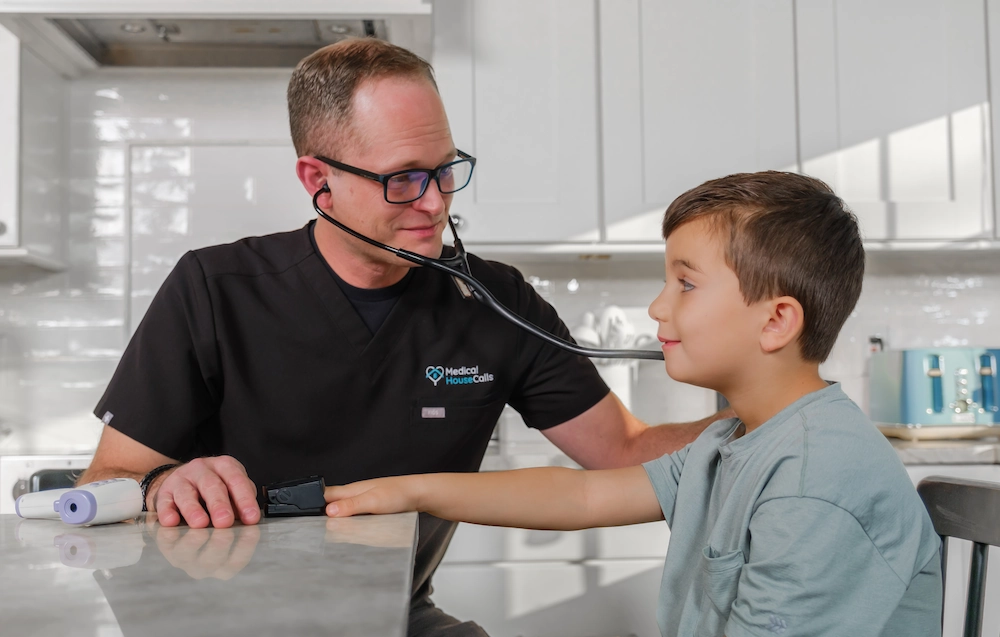
Urgent Care, Right at Home
Table of Contents
The Vital Role Of Urgent Care: Knowing When It’s Essential
Urgent care facilities have become crucial to modern healthcare, offering medical attention for various non-life-threatening conditions. Understanding when it’s essential to seek care can make a difference in the well-being of individuals.
This article will explore how going to urgent care (or urgent care coming to you) is convenient and invaluable. Continue reading so that you know when to go to urgent care for future reference.
What Is Urgent Care?
Urgent care is a specialized service that bridges the gap between primary care and emergency room services. These facilities are designed to address immediate healthcare needs that cannot wait for a scheduled appointment with a primary care physician but do not warrant the resources of an emergency room.
Urgent care centers are staffed with qualified healthcare professionals, including physicians, nurses, and medical assistants, who are equipped to diagnose and treat assorted injuries and illnesses.
Benefits of Urgent Care
- Immediate but Non-Emergency Situations: Urgent care is designed to address medical issues that require prompt attention but do not warrant a visit to the emergency room. Examples include sprains, strains, and minor fractures and conditions like ear infections, minor burns, and flu symptoms. In these cases, urgent care can provide quicker and cost-effective solutions.
- Limited Access to Primary Care: Many individuals face challenges in accessing appointments with their primary care physicians. Urgent care becomes essential when individuals need immediate medical attention, and their healthcare provider is unavailable. This is crucial for managing chronic conditions or receiving time-sensitive treatments.
- Minor Injuries: Accidents happen; urgent care is ideal for minor injuries such as cuts, abrasions, or small burns. Urgent care centers provide stitches, wound care, and other treatments to prevent complications.
- Common Illnesses and Infections: Urgent care is vital in managing common illnesses and infections, such as strep throat, urinary tract infections, and respiratory infections. Prompt diagnosis and treatment can help individuals recover more quickly.
- Convenience and Extended Hours: Urgent care centers often offer extended hours and weekend availability, making them a convenient option for individuals with busy schedules or those who require care outside of typical office hours. This accessibility is essential for addressing health concerns and preventing the delay of medical attention.
- Diagnostic Services: Many facilities provide on-site diagnostics, including X-rays and laboratory testing. This capability is crucial for identifying and addressing medical issues such as bone fractures or infections.
- Referrals and Follow-Up: Urgent care centers often collaborate with primary care physicians and specialists, facilitating referrals and follow-up care. This coordination ensures that individuals receive comprehensive and continuous healthcare, even after their urgent care visit.
Assessing the Severity of Your Symptoms to Know When to Go to Urgent Care
While not exhaustive, the following are some signs that may indicate the need for prompt medical attention:
Difficulty Breathing or Shortness of Breath
If you experience difficulty breathing, it’s a clear sign that urgent care is needed. This could indicate respiratory issues, asthma attacks, or other conditions requiring immediate attention.
Chest Pain or Severe Chest Discomfort
Chest pain can be a symptom of various conditions, including heart problems or respiratory issues. Chest discomfort should be addressed to rule out life-threatening conditions.
Severe Abdominal Pain
Intense abdominal pain can be a sign of numerous issues, including appendicitis, kidney stones, or gastrointestinal problems. If the pain continues or worsens, seeking urgent care is crucial for diagnosis and appropriate treatment.
Head Injuries
A head injury that results in loss of consciousness, confusion, vomiting, or headaches should be evaluated. Urgent care centers provide assessments, including imaging if necessary, to rule out complications.
Fever and Dehydration
A fever, especially in combination with dehydration, can be concerning. Urgent care can address the underlying cause of the fever and offer appropriate treatment.
Persistent Vomiting or Diarrhea
If vomiting or diarrhea is severe, it can lead to dehydration. Urgent care can manage symptoms, rehydrate the body, and identify the cause of gastrointestinal distress.
Allergic Reactions
Anaphylaxis, an allergic reaction, requires immediate attention. Symptoms may include difficulty breathing, swelling of the face and throat, and a rapid drop in blood pressure. Urgent care can administer life-saving interventions, such as epinephrine.
Injuries Requiring Stitches or X-rays
Urgent Care is well-equipped to handle minor injuries requiring stitches or X-rays. This includes cuts, lacerations, and minor fractures. Timely care can prevent complications and ensure proper healing.
Severe Pain or Discomfort
Unrelenting pain may indicate an underlying issue, whether in the abdomen, chest, or elsewhere. Urgent care professionals can assess the source and provide appropriate pain management or treatment.
Persistent Flu-Like Symptoms
A high fever, body aches, and respiratory issues accompanying the flu can become severe. Urgent care can provide prompt evaluation, antiviral medications, and supportive care to alleviate symptoms.

Urgent Care vs. Emergency Room (ER)
In certain situations, surpassing the scope of care provided by urgent care facilities is paramount. If you experience symptoms that could indicate a life-threatening condition, immediate attention from an emergency room is crucial. Signs such as chest pain or pressure, difficulty breathing, uncontrolled bleeding, loss of consciousness, or symptoms of a stroke, such as numbness or weakness, demand evaluation in an emergency setting.
Furthermore, if someone is experiencing an allergic reaction with symptoms like difficulty breathing, swelling of the face and throat, or a rapid drop in blood pressure, it necessitates immediate intervention. It is always safer to call emergency services for guidance if in doubt.
Common Conditions Treated In ER
The emergency room treats a wide range of conditions, including but not limited to severe injuries, chest pain, respiratory distress, abdominal pain, and neurological emergencies.
Common Conditions Treated In Urgent Care
Services include treatment for minor injuries, common illnesses, infections, and diagnostic services such as X-rays and laboratory testing.
Urgent Care vs. Primary Care
Urgent and primary care serve distinct but complementary roles. Primary care addresses a broad spectrum of health needs, including preventive services, management of chronic conditions, and the diagnosis and treatment of common illnesses.
In contrast, urgent care provides immediate, non-emergency medical attention for acute issues requiring prompt treatment but not severe enough for an emergency room visit. Urgent care is designed to offer services outside common office hours, addressing injuries, infections, and other concerns.
While primary care focuses on overall health and wellness, urgent care addresses immediate health issues. The collaboration between primary care and urgent care ensures that individuals receive comprehensive healthcare services across their medical needs.
Tips for Making the Most of Your Urgent Care Visit
- Know When to Go: Urgent care is for non-life-threatening conditions requiring immediate attention but not needing an emergency room visit. If your situation is critical, call emergency services.
- Bring Necessary Information: Bring your identification, insurance card, and a list of medications you take. Providing accurate and complete information helps the healthcare team make informed decisions.
- List Your Symptoms and Timeline: Make a list of your symptoms, including when they started and changes. This assists healthcare providers in diagnosing and treating your condition.
- Medication List and Allergies: Provide a list of current medications, including dosages, and disclose known allergies. This helps prevent potential drug interactions or allergic reactions.
- Have a Primary Care Physician: If you have a primary care physician, inform the urgent care staff. This facilitates communication between healthcare providers and ensures continuity of care.
- Describe Your Medical History: Describe your medical history, including chronic conditions or recent illnesses. This aids in understanding your health and guides the team in providing appropriate care.
- Ask Questions: Be inquisitive about your diagnosis, prescribed medications, or follow-up care. Understanding your treatment plan is vital for your recovery.
- Follow-Up with Your Primary Care Physician: If urgent care prescribes medication or recommends follow-up care, visit your primary care physician for comprehensive and ongoing healthcare.
- Understand Billing and Insurance: Get familiar with the insurance coverage and be aware of out-of-pocket expenses. This prevents financial surprises and helps you make informed healthcare decisions.
- Provide Feedback: After the visit, consider providing feedback. This can assist the facility in maintaining high-quality services and addressing concerns.
Urgent Care Access and Cost
The fees are often lower, making urgent care centers a cost-effective alternative, particularly for individuals without insurance or with high deductibles. This affordability reduces the financial burden on patients and the healthcare system.
Moreover, the streamlined nature of urgent care services, focusing on immediate needs, often results in shorter wait times. This provides convenience for patients and contributes to cost savings by optimizing resources.
Cost Considerations for Patients
- Insurance Coverage and Verification: Patients should understand their coverage, including copays, deductibles, and applicable coinsurance. Insurance terms can impact the cost of your urgent care visit.
- Out-of-Pocket Expenses: Even with insurance, patients often have out-of-pocket expenses. This includes copayments or coinsurance that may apply to urgent care visits. Knowing these costs in advance allows patients to avoid financial burdens.
- Prescription Medication Costs: If the urgent care visit involves a prescription, inquire about the cost of the medication. Ask the healthcare provider for generic alternatives or if there are discounts or savings programs. Awareness of medication costs contributes to a more accurate financial impact assessment.
- Diagnostic Services Fees: Many urgent care centers provide on-site diagnostics like X-rays and laboratory tests. Patients should be aware of the associated fees, as they can contribute to the cost.
- Comparison with Emergency Room Costs: Emergency room visits are more expensive, and understanding the differential expenses can influence decision-making. Choosing the appropriate care based on the severity of the issue is not only medically sound but can also be more cost-effective.
By paying attention to these fees, patients can navigate the fiscal aspects of their healthcare, make informed decisions about where to seek care, and avoid financial strain.
Benefits of At-Home Urgent Care
Convenience and Comfort
At-home urgent care brings medical attention to your doorstep, eliminating the need to travel and allowing you to receive care in the comfort of your home. This convenience is particularly valuable for individuals with mobility issues, busy schedules, or those who prefer a familiar environment.
Reduced Exposure to Illnesses
Opting for at-home urgent care minimizes the risk of exposure to contagious illnesses present in traditional medical facilities. This is more relevant during times of widespread infections, making it a safer option for those who mitigate their exposure to potential pathogens.
Timely Access to Healthcare
At-home urgent care services often offer timely appointments, ensuring that individuals receive medical attention promptly. This can be crucial for addressing acute health concerns and preventing the progression of certain conditions, providing peace of mind and timely relief.
Family-Friendly Relationship With Doctor
At-home urgent care caters to the healthcare needs of all family members within the comfort of your home. This benefits families with young children, elderly relatives, or individuals who may find traveling to a medical facility challenging.
Telehealth Technology and Remote Monitoring
Many providers leverage telehealth, enabling remote consultations with healthcare professionals. Some services incorporate remote monitoring devices, allowing providers to assess vital signs and other health metrics without an in-person visit. This enhances the quality and efficiency of care.
Schedule an At-Home Urgent Care Appointment with Medical House Calls
Urgent care facilities are pivotal in modern healthcare, offering accessible medical attention for various non-life-threatening conditions. Their ability to bridge the gap between primary care and emergency rooms, coupled with extended hours and comprehensive services, makes them a valuable resource for individuals seeking immediate healthcare solutions.
Recognizing the significance of addressing acute medical needs, we encourage you to prioritize your health by seeking prompt attention when necessary. If you require urgent care in the convenience of your home, contact Medical House Calls at (615) 838-2375. With same-day and next-day appointments, we are committed to providing personalized healthcare to meet your needs. Your health and well-being is our top priority.
Unlimited Urgent Care House Calls









